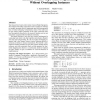79 search results - page 1 / 16 » Class Label Enhancement via Related Instances |
EMNLP
2011
12 years 10 months ago
2011
Class-instance label propagation algorithms have been successfully used to fuse information from multiple sources in order to enrich a set of unlabeled instances with class labels...
PAMI
2006
13 years 10 months ago
2006
Multiple-instance problems arise from the situations where training class labels are attached to sets of samples (named bags), instead of individual samples within each bag (called...
IJCAI
2001
14 years 7 days ago
2001
Supervised and unsupervised learning methods have traditionally focused on data consisting of independent instances of a single type. However, many real-world domains are best des...
ICFP
2010
ACM
13 years 12 months ago
2010
ACM
Type classes have found a wide variety of uses in Haskell programs, from simple overloading of operators (such as equality or ordering) to complex invariants used to implement typ...
TKDE
2010
13 years 9 months ago
2010
In multiple-instance learning (MIL), an individual example is called an instance and a bag contains a single or multiple instances. The class labels available in the training set ...

